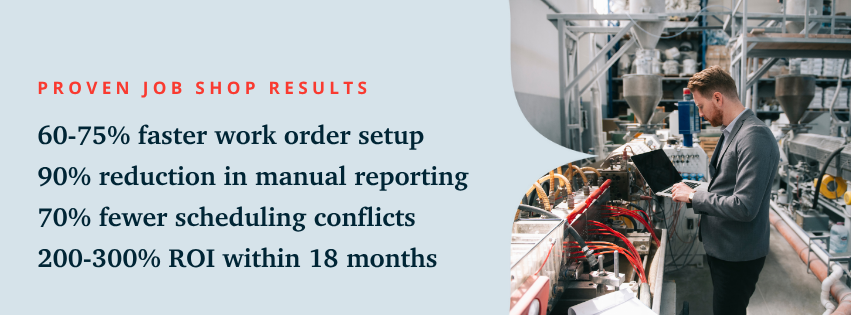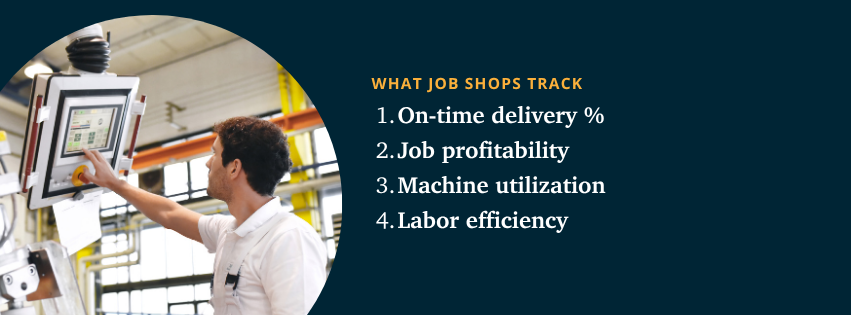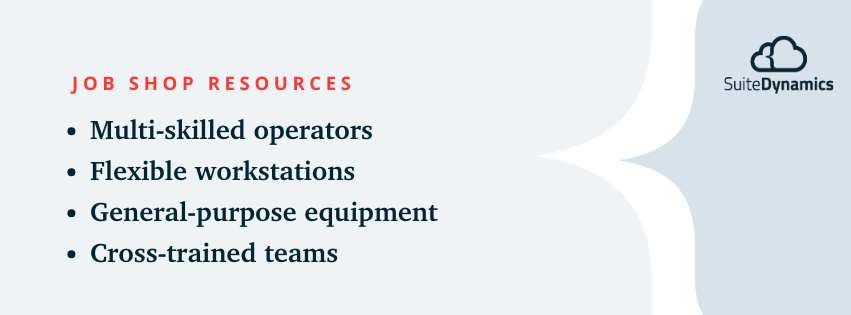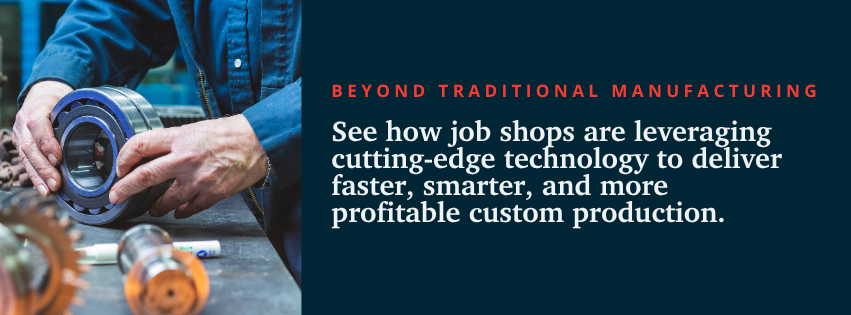What is Job Shop Manufacturing? Complete 2025 Guide
Job shop manufacturing is a production method where small batches of 1-100 units of customized or unique products are made to meet specific customer requirements. Unlike mass production, each order typically requires unique setups, specialized processes, and custom routing through the facility.
In this comprehensive guide, you'll learn:
- The complete definition of job shop manufacturing
- How job shops differ from other manufacturing types
- Industries that rely on job shop methods
- Technology solutions that optimize job shop operations
- When to consider implementing specialized ERP systems
What is Job Shop Manufacturing? (Definition)
Job shop manufacturing is a production strategy focused on customization over volume. Instead of producing thousands of identical items, job shops create small quantities of unique products tailored to specific customer specifications.
Key defining characteristics:
- Small batch sizes - Typically 1-100 units per order
- High product variety - Hundreds or thousands of different products
- Custom specifications - Each order has unique requirements
- Project-based workflow - Work orders last days to weeks
- Skilled labor - Requires specialized expertise and flexibility
Job Shop is a powerful, fully integrated solution built for custom manufacturers, combining quoting, configuration, production, and fabrication workflows inside NetSuite. Learn more about SuiteDynamics' NetSuite Job Shop for Manufacturing.

Job Shop vs. Other Manufacturing Types
Understanding how job shop manufacturing compares to other production methods helps clarify when this approach is most effective:
Job Shop vs. Mass Production
| Aspect | Job Shop Manufacturing | Mass Production |
|---|---|---|
| Batch Size | 1-100 units | 1,000+ units |
| Product Variety | High (hundreds of products) | Low (few standard products) |
| Customization | Extensive customization | Minimal customization |
| Setup Time | Frequent setups | Rare setups |
| Lead Time | Days to weeks | Hours to days |
| Cost per Unit | Higher | Lower |
| Flexibility | Very high | Very low |
Job Shop vs. Flow Manufacturing
Flow manufacturing uses a continuous, linear process where products move through workstations in a predetermined sequence. Job shops, by contrast, route products based on specific requirements, meaning different orders may follow completely different paths through the facility.
Job Shop vs. Cellular Manufacturing
Cellular manufacturing groups similar products into families and dedicates equipment cells to those families. Job shops handle much higher variety and don't have the volume to justify dedicated cells for product families.
Industries That Use Job Shop Manufacturing
Job shop manufacturing is essential across numerous industries that require customization and flexibility:
- Custom Metal Fabrication
Examples: Custom steel structures, architectural metalwork, specialized machinery components
Why job shop works: Each project has unique specifications, materials, and dimensions - Prototype Development
Examples: Aerospace prototypes, automotive testing components, medical device prototypes
Why job shop works: One-off or small-batch production for testing and validation - Custom Furniture and Woodworking
Examples: Bespoke furniture, custom cabinetry, architectural millwork
Why job shop works: Each piece is designed to customer specifications and space requirements - Tool and Die Manufacturing
Examples: Custom tooling, specialized dies, precision fixtures
Why job shop works: Tools are designed for specific applications and production runs - Specialty Machinery Manufacturing
Examples: Custom automation equipment, specialized processing machinery
Why job shop works: Each machine is engineered for specific customer applications - Custom Construction and Remodeling
Examples: Custom homes, commercial renovations, specialized construction projects
Why job shop works: Every project has unique requirements, materials, and timelines - Jewelry and Luxury Goods
Examples: Custom jewelry, luxury watches, artisan crafts
Why job shop works: High customization and personalization requirements - Formula-Based Manufacturing
Examples: Custom chemicals, specialty food products, pharmaceuticals
Why job shop works: Small batches with specific formulations and quality requirements

Job Shop Manufacturing Process Flow
The typical job shop workflow involves several key stages:
Customer Inquiry and Quoting
- Customer provides specifications and requirements
- Engineering review and feasibility analysis
- Cost estimation and quote generation
- Quote approval and order placement
Job Planning and Scheduling
- Work order creation with detailed specifications
- Routing determination based on required operations
- Resource allocation (labor, equipment, materials)
- Production scheduling considering capacity constraints
Material Procurement and Preparation
- Raw material ordering based on job requirements
- Material receiving and quality inspection
- Material preparation and cutting to size
- Work area setup and tool preparation
Production Execution
- Work order release to shop floor
- Sequential operations according to routing
- Quality checks at critical control points
- Progress tracking and time recording
Quality Control and Finishing
- Final inspection and testing
- Rework if necessary to meet specifications
- Finishing operations (painting, coating, etc.)
- Final quality approval and documentation
Packaging and Delivery
- Custom packaging based on product requirements
- Shipping preparation and documentation
- Delivery coordination with customer
- Invoice generation and project closure
Common Job Shop Challenges
Job shop manufacturers face unique operational challenges that require specialized solutions:
- Complex Scheduling and Planning
Challenge: Balancing multiple custom orders with varying priorities and due dates
Impact: Resource conflicts, delayed deliveries, increased costs
Solution: Advanced planning and scheduling software with real-time visibility - Accurate Job Costing
Challenge: Tracking labor, materials, and overhead costs for each unique job
Impact: Inaccurate pricing, reduced profitability, poor decision-making
Solution: Real-time job costing systems with automated data collection - Quote Generation Speed and Accuracy
Challenge: Quickly generating accurate quotes for complex custom work
Impact: Lost opportunities, inaccurate pricing, customer dissatisfaction
Solution: Configure-Price-Quote (CPQ) systems with automated pricing rules - Quality Control Consistency
Challenge: Maintaining quality standards across diverse products and processes
Impact: Rework, customer complaints, compliance issues
Solution: Automated quality management systems with standardized workflows - Shop Floor Communication
Challenge: Ensuring accurate information flow between planning and execution
Impact: Production errors, delays, inefficiencies
Solution: Real-time shop floor data collection and mobile access systems
These challenges are why SuiteDynamics built a NetSuite Job Shop solution for manufacturing companies. Learn more about our NetSuite Job Shop Manufacturing Solutions.

Technology Solutions for Job Shop Manufacturing
Modern job shops require specialized technology to compete effectively:
Enterprise Resource Planning (ERP) Systems
Purpose: Integrate all business processes in a single system
Key features for job shops:
- Project-based work order management
- Real-time job costing and profitability tracking
- Advanced scheduling and capacity planning
- Integration with shop floor data collection
Manufacturing Execution Systems (MES)
Purpose: Bridge the gap between planning and shop floor execution
Benefits:
- Real-time production tracking
- Quality data collection
- Labor and machine utilization monitoring
- Paperless work instructions
Configure-Price-Quote (CPQ) Software
Purpose: Automate the quoting process for complex custom products
Benefits:
- Faster quote generation
- Improved pricing accuracy
- Consistent product configuration
- Integration with manufacturing systems
Computer-Aided Design (CAD) Integration
Purpose: Streamline the design-to-manufacturing process
Benefits:
- Automated bill of materials generation
- Direct integration with manufacturing systems
- Version control and change management
- Reduced design errors
When Do You Need a Specialized Job Shop ERP?
Consider implementing specialized job shop ERP solutions when you experience:
Business Growth Indicators
- Revenue: $2M+ annually with growth trajectory
- Employees: 10+ production workers
- Complexity: Managing 50+ concurrent work orders
- Customer base: Serving diverse industries with custom requirements
Operational Pain Points
- Manual processes causing errors and delays
- Difficulty tracking job profitability
- Slow quote turnaround times
- Quality control inconsistencies
- Poor visibility into production status
Technology Readiness Signs
- Outgrown existing systems or spreadsheets
- Need for real-time data and reporting
- Requirement for integration with other business systems
- Desire for mobile access and paperless operations

The Future of Job Shop Manufacturing
Several trends are shaping the future of job shop manufacturing:
Industry 4.0 and Smart Manufacturing
- IoT sensors for real-time machine monitoring
- Predictive maintenance to reduce downtime
- Advanced analytics for optimization
- Digital twin technology for process simulation
Automation and Robotics
- Collaborative robots (cobots) for flexible automation
- Automated material handling systems
- Computer-controlled machining and fabrication
- Integration with planning and scheduling systems
Additive Manufacturing (3D Printing)
- Rapid prototyping capabilities
- Low-volume production of complex parts
- Reduced tooling and setup costs
- Mass customization opportunities
Artificial Intelligence and Machine Learning
- Demand forecasting and capacity planning
- Automated scheduling optimization
- Predictive quality control
- Intelligent pricing and quoting
Getting Started with Job Shop Manufacturing Solutions
If you're considering implementing technology solutions for your job shop, follow these steps:
Assess Your Current State
- Document existing processes and pain points
- Quantify costs of manual operations
- Identify integration requirements
- Define success metrics and goals
Research Solution Options
- Compare ERP systems designed for job shops
- Evaluate specialized modules and capabilities
- Consider implementation complexity and timeline
- Calculate total cost of ownership
Select Implementation Partners
- Look for partners with job shop experience
- Verify references from similar manufacturers
- Assess ongoing support capabilities
- Understand implementation methodology
Plan for Success
- Allocate adequate resources for implementation
- Plan for change management and training
- Define project phases and milestones
- Prepare for data migration and testing
Conclusion: Optimizing Job Shop Operations
Job shop manufacturing represents a crucial segment of the manufacturing economy, serving industries that require customization, flexibility, and specialized expertise. While job shops face unique challenges in scheduling, costing, and quality control, modern technology solutions can address these pain points effectively.
Key takeaways:
- Job shop manufacturing focuses on small batches and high customization
- Success requires specialized technology designed for project-based workflows
- Real-time visibility and automated processes are essential for competitiveness
- Proper solution selection and implementation planning are critical for success
Ready to optimize your job shop operations?
SuiteDynamics specializes in NetSuite solutions for job shop manufacturers. Our SuiteX Job Shop Bundle provides five integrated modules designed specifically for custom manufacturing workflows.
Schedule a free assessment to discover how SuiteX Job Shop can transform your job shop operations.
Experience NetSuite Success with SuiteDynamics - Your Manufacturing ERP Specialists











